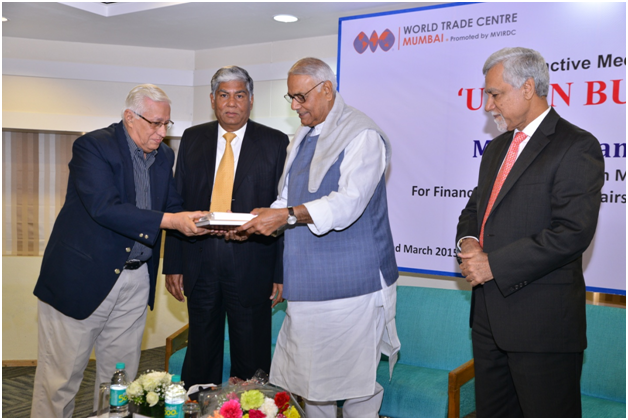“The Union Budget 2015-16 is expected to create virtuous cycle as its thrust on infrastructure investment would spur private sector capital formation and consumption in the overall economy. The recessionary trend in the Japanese, Eurozone economies and the slowdown in the Chinese economy would depress global demand. This would in turn force Indian companies to depend on domestic demand. The Budget, by giving push to infrastructure spending, would lift domestic demand through the virtuous cycle”, said Mr Yashwant Sinha, Former Union Minister for Finance and External Affairs, Government of India at an interactive meeting jointly organized by MVIRDC World Trade Center and All India Association of Industries at WTC on 2nd March 2015..
Noting the decline in the savings rate in the economy from 37 per cent (as a proportion of GDP) a few years ago to less than 30 per cent at present, Mr. Sinha expressed hope that this budget would encourage savings. The increase in savings would consequently lead to a rise in investment rate to 39 per cent and lead to overall economic growth rate of 9-10 per cent. The philosophy behind the present government policy is to ensure that public spending leads to creation of productive assets rather than enhancing money in the hands of the people, which would create inflation, he opined.
Mr. Sinha expects the fall in WPI and CPI to prompt RBI to reduce interest rate by 50 basis points in its next monetary policy review.

While various measures were announced in the budget to boost funding for the infrastructure sector, Mr Sinha raised concerns about the huge delay in implementation of projects on account of hassles such as land acquisition and environmental clearances. But he felt that the government’s ‘plug and play’ concept would address these hassles in the days ahead. Highlighting the importance of irrigation in raising agriculture output, Mr. Sinha welcomed the Rs. 5,300 crore support for micro-irrigation, watershed development and the ‘Pradhan Mantri Krishi Sinchai Yojana’.
Highlighting the multiplier effect of investments in the realty sector, he commented that the rise in the tax exemption limit for interest rate on housing loan should have been raised up to Rs. 250,000 as against the budget proposal of up to Rs 200,000.
Mr. Sinha also expressed disappointment over the government’s inability to stick to the fiscal deficit target of 3.6 per cent set out by the 14th Finance Commission for 2015-16 ( the budget estimate of fiscal deficit for 2015-16 is 3.9 per cent).
On the taxation front, he expressed dissatisfaction over the government’s stance to do away with the introduction of Direct Tax Code (DTC). Mr. Sinha was of the view that the country needs a new DTC which would spell out the government’s philosophy on direct taxation. Specifically, DTC should have a clause that links personal income tax exemption limit with CPI, he remarked.
Mr Sinha concluded by highlighting the procedural challenges in introducing GST by April 2016.
Earlier in his welcome remarks, Mr. Vijay Kalantri, Vice Chairman, MVIRDC World Trade Center and President, All India Association of Industries, hailed the budget 2015-16 as the third phase of economic reforms since 1991. While lauding the budget for its thrust on infrastructure, he said the success of it lies in effective and timely implementation. Mr. Kalantri expressed satisfaction on the overall fine print of the budget including deferral of GAAR by two years, tax on super rich and the budget’s stress on non-adversarial tax regime. However, he expressed concern over the huge size of non-plan expenditure and the marginal decline in plan expenditure in 2015-16. Further, he was of the view that more could have been done in the budget for promoting the MSME Sector. Specifically, he suggested that SIDBI should have been given an independent status.
Capt. Somesh Batra proposed the vote of thanks.